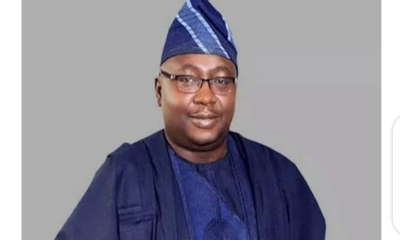GR Diary
Why do men kneel on a knee to propose?


By: Nmerichukwu Igweamaka
For many people, proposals are supposed to be the kind of romantic whirlwind you’ve only ever previously experienced while reading fairytales.
The love of your life gets down on one knee, triggering you to plummet into some kind of alternate universe where you’re surrounded by rose petals, dimly-lit candles, heart-shaped balloons and general happy, warm feelings.
But if you think about it, it’s actually kind of odd; the getting down on one knee bit. We get that it’s tradition and stuff – but if you really think about it, what on earth has a man got to gain by hobbling down onto one knee? Aside from the fact it puts him at roughly the right height to literally reach for your hand in marriage, obviously.
The idea of kneeling on one knee as essential to the standard proposal is not enshrined in history; it appears to be a largely modern invention, but it’s not clear how it originated.
The engagements we know most about in history are the ones between nobles and the wealthy, and those were often in the manner of business arrangements, with none of this “kneeling before your beloved” stuff. In fact, paintings of noble betrothals in history invariably depict both parties as standing or seated; no kneeling shows up at all.
One possible origin of the modern kneeling ideal is in the Middle Ages tradition of courtly love, in which a man of good birth essentially devoted himself (complete with poems, odes, deeds of honor, and general vassalage) to a noblewoman he perceived as superior.
The entire principle of this popular attitude was that the man was a kind of servant to the woman, whom he idealized beyond all reality; and he performed his servitude by kneeling, spiritually and figuratively. (Whether they ever actually got together is a matter of historical debate.
Probably not, in a lot of cases; many of the women in question were married.) Kneeling represented feudal surrender and admiration. Historians have actually had arguments about whether certain medieval images show men kneeling to their courtly loves, or to their male masters.
But kneeling in general in European history which was imitated by Africa has been a sign of supplication, humility, and servitude.
A lot of Christian iconography of prayer, for instance, involves kneeling, expressing your service to and debasement before God; and it’s also been pointed out that kneeling between men was a big sign of status.
Knights kneeled before their lords to receive honors, and surrendering armies kneeled before their conquerors. Kneeling to the woman you’re going to marry may be part of the same thing: a request for her favor and a physical demonstration of loyalty and surrender.
It seems to have first shown up in the 19th century, but as to why, your guess is as good as mine.
The Ring
The first reliable records of engagement rings for women, declaring that they would in the future be married to a specific man, dates to the Roman period, where betrothed women were given a gold ring to wear in public and an iron one to wear at home while doing household tasks.
But rings themselves as engagement symbols were likely around for many centuries, but they turn up in law at several points.
The Visigothic Code, a set of Spanish laws from the 7th century, declared that betrothal rings, like pledges in business, could not be revoked once they were given; you had to get married. Pope Nicholas I in 860 attempted to make an expensive, gold engagement ring legally necessary, so that men would make a significant monetary sacrifice and take the marriage seriously.
And the idea of a “betrothal” as a legal period of time (a gap between the intention to get married and actually performing the ceremony) was enshrined in Christian church law in 1215. Pope Innocent III declared that there had to be a waiting period between wanting to get married and being able to do it legally “so that if legitimate impediments exist, they may be made known”. (Impediments, as we all know from Jane Eyre, usually consisted of there being previous wives and husbands still living.)
The first recorded engagement ring with diamonds dates back to 1477, but it didn’t involve a solitaire; the ring in question was a gift from Archduke Maximilian of Austria to the noblewoman he was courting, 20-year-old Mary of Burgundy.
The famous jewelers Harry Winston describe the ring as “a delicate band adorned with diamonds in the shape of her first initial”.
Mary of Burgundy was a hugely powerful woman, and had her choice of eminent suitors, so this first diamond “engagement” ring probably wasn’t the thing that won her affection; it’s likely she’d selected Maximilian for her hand and he gave her the ring to cement the arrangement. (Tragically, Mary died after a horse riding accident at the age of 25.)
After Mary of Burgundy, the real beginnings of the diamond engagement ring tradition only emerge in the late 1800s, when a mining company struck rich seams of diamonds in Africa and formed a jewelry department, De Beers, to deal with it.
De Beers’ master stroke came in the 1930s and ’40s, when it employed a hugely successful “Diamonds Are Forever” advertising campaign to insist to the American population that diamonds were scarce, expensive, and the only viable way in which to propose marriage.
De Beers consciously created the status of the diamond engagement ring, and it still goes down as one of the most successful advertising ideas of all time: diamond engagement rings are, in most Western countries, now seen as the only acceptable option when a man declares his intention to marry you.
Credits: dailyadvent
Events
Stakeholders Head to Enugu for first Southeast Educators Conference


Stakeholders in the education circle are warming up for the maiden edition of Southeast Educators’ Conference 2024(SEEC’24).
The two-day SEEC’24 scheduled to hold 18th & 19th, April 2024 at Nike Lake Resort, Enugu under theme: Future-‘Focused Learning – Igniting the Competitive Edge’ promises to host key players in the education sector with a potential attendance of over 500 delegates.
The conference will feature a diverse lineup of speakers, covering topics ranging from holistic learning approaches to cutting-edge technology integration.
Speaking ahead of the conference, Mrs Doris Chinedu-Okoro, CEO, Evergreen Group, said SEEC’24 is the first of its kind in the Southeast region, presenting a historic opportunity for stakeholders to pioneer positive change in the local education sector.
“It brings together diverse perspectives and innovative ideas,fostering collaboration and networking among educators and stakeholders.
Hundreds of delegates will be in attendance.
“SEEC’24 is dedicated to exploring transformative practices, emphasising holistic learning, technology integration, global citizenship, life-long learning, and community engagement”, she said.
Mr. Osita Chidioka, the former Nigeria’s Minister of Aviation, who recently launched an online mentorship and leadership programme for Nigerian youths named Mekaria Mentorship Programme (MMP) Foundation Course, will deliver the keynote at SEEC’24.
Prof. Pieter Verdegem; Dr. Joy Isa, Mrs. Bukola Adewuiyi, Lady Uju Dike, Fr. John Njorteah, Alex Onyia, Rotimi Eyitayo, Rhoda Odigboh, Elfrida Diete-Spiff Omole, Dr. ChibuezeLawrence Ofobuike, Ify Obidi-Essien, Dr. Abimbola Ogundere, Angelina Ikeako, Odetola Ebenezer Israel and OgochukwuOnyia, are some of the speakers lined up for the event.
The Evergreen Group CEO added that the conference thrives on a vision to create a dynamic platform that equips educators with the tools and knowledge needed to make a lasting impact on the educational landscape of South-Eastern Nigeria.
SEEC’24 is open to School Owners, Heads of Schools (Public and Private), Educational Stakeholders, Counselors, Teachers, Parents, Investors, Startups, and others in the education ecosystem.
“Participants will have the opportunity to engage in two full days of conference sessions, diving deep into the future of Education.
“There will be ample networking opportunities with school leaders from across the geopolitical zone and beyond.
“The evening Gala Night promises a delightful atmosphere for dancing, dining, wining, and fostering deeper connections in a relaxed setting”, she further explained.
Registration is N100,000 via: https://bit.ly/3uTcv9e
GR Diary
PAFON: Digital Encode, Cybervergent, Payble Sign Up for Payments Forum Nigeria 1.0


· Experts to Discuss Trust, Security and Privacy in AI Era
Payments Forum Nigeria (PAFON), the cross-industry platform focused on addressing issues that require broad cooperation and coordination across many constituents in the payments industry, has attracted sponsorships from Digital Encode Limited, Cybervergent and Payble.
Financial industry experts are warming up for the first edition of PAFON, scheduled to take place at Oriental Hotel, Lekki Road, Lagos on Thursday March 21, 2024, by 9am.
The Forum aims at providing an inside-look at the industry, offering perspectives from key stakeholders, including payment networks, technology innovators, leading merchants, issuers, acquirers and payment processors.
Throughout the years, the finance world has shifted into something much more than just banking and big corporations.
Speaking ahead of the star-studded PAFON 1.0, with the theme: “Payments: Trust, Security and Privacy in AI Era”, Dr. Adewale Peter Obadare, the Chief Visionary Officer [CVO], Digital Encode Limited, said that customers want to be assured that their sensitive information, such as credit card numbers and personal details, is treated with utmost care hence security has become paramount in the payments industry.
“Secure payment processing ensures that data breaches are minimized, instilling confidence in customers to keep coming back. Nigerian financial institutions reported ₦159 billion ($201.5 million) lost to fraud cases since 2020, according to the Financial Institutions Training Centre (FITC). This is what the experts must tackle and customer awareness is key too”, he said.
Based on a report by Gartner, by 2024, 40% of privacy compliance technology will rely on AI, up from 5% in 2019, and by 2025, 60% of large organizations will use at least one privacy-enhancing computation technique in analytics, business intelligence, or cloud computing, and financial services industry is no exempted.
On the other hand, Roosevelt Elias, the co-founder of Payble, described PAFON as a ‘must-attend’ Forum due to the ‘issues listed to be discussed are germane and require critical attention. For instance, building financial inclusive products requires a mix of technology and illiteracy. The industry can’t achieve this by working in silos; we just have to unite to achieve the set target on financial inclusion, particularly for the rural dwellers.
Digital Encode (a leading consulting and integration that specializes in the design, management, and security of business-critical architecture); Cybervergent (a company dedicated to helping protect business sensitive data from cyber-attacks, including customer information, financial records and intellectual property); Payble (a fintech startup that modernises local government payments such as creating citizen-centric payment experiences, delivering flexible billing and simplified rate collection, will be joined at PAFON 1.0 by Inlaks, an IT company that offers core banking, fraud management, cybersecurity, cloud, data center, enterprise risk management, amongst other industry players.
“Our goal is to enable information exchange and knowledge sharing on key industry insights issues amongst key stakeholders, with the objective of ensuring a collaborative and proactive approach to push for policies that enable growth, tackling/mitigating fraud and limiting occurrences and losses”, said Mr. Chike Onwuegbuchi, the co-founder of TechCastle Foundation, organisers of Payment Forum Nigeria (PAFON).
He said that the Forum is driven by the reasons to; “educate and inform financial service players and other stakeholders on various issues and trends (both locally and globally); proactively share data/information amongst banks, Fintechs and other service providers, to enable prompt responses to prevent and/or limit (customer-related) losses; and discuss key Payments security trends”.
“Speakers will be drawn among industry players such as banks, Fintechs, mobile money operators, blockchain experts, Cybersecurity, etc., as we expect attendees from the Central Bank of Nigeria (CBN); e-Banking Heads; Chief Compliance Officers of banks in Nigeria; Chief Internal Auditors of banks in Nigeria; Office of The National Security Adviser; Switching companies; the Economic and Financial Crimes Commission; Licensed Mobile Payment Operators; Electronic Payments Providers; Information Security Experts; Consumer Protection; Financial Policy and Regulation; Information Technology; Legal Services; Banking Supervision; Corporate Communication; Shared Services Office; Blockchain Security Experts, etc”, he added.
Participation:
Participation is free; however, you are required to pre-register using the link here: https://bit.ly/4c4N19H
For sponsorship, please contact: Mr. Chike Onwuegbuchi via: 08123355522 or Peter Oluka: 08184346261 or email: [email protected].
GR Diary
Digital Landscape Harmonization: Anambra’s ISPs, HEIs Invited to AFRINIC One-Day Training
By; SANDRA ANI


The Anambra State ICT Agency, in a strategic collaboration with the Internet Exchange Point of Nigeria (IXPN), recently, successfully organized a one-day interactive session that brought together Internet Service Providers (ISPs) and Higher Educational Institutions (HEIs), to discuss the imperativeness for interconnectivity and to lay the foundation for establishing an Internet Exchange Point in the State.
The collaborative session saw vibrant discussions and resolutions aimed at creating a more livable state and a robust economy through increased internet access and connectivity.
In furtherance of the milestone recorded with the interactive session, and in recognition of the pivotal role of ISPs and HEIs in expediting actions towards this interconnectivity, a one-day AFRINIC virtual training program has been scheduled to take place on Tuesday, 5th December by 12.00pm.
The follow-up virtual training will not only provide participants with invaluable insights, technical expertise, and practical knowledge to optimize their network infrastructures but will further yield answers to key questions posed by ISPs and HEIs.
AFRINIC, the Regional Internet Registry for Africa, is renowned for its commitment to advancing internet development across the continent. The AFRINIC virtual training therefore represents a significant stride towards realizing the goals outlined during the interactive session.
This initiative aligns perfectly with the vision of Governor Charles Chukwuma Soludo, CFR, of building a technologically advanced state, while the collaborative efforts of the Anambra State ICT Agency and the Internet Exchange Point of Nigeria (IXPN) underscores practical commitment to positioning Anambra as a digital hub, driving innovation, economic growth, and improved quality of life for its residents.
Participants can expect an interactive and immersive learning experience, equipping them with the skills necessary to navigate the dynamic landscape of internet services in the State.
-



 Politics4 days ago
Politics4 days ago“Fuel Subsidy Removal Was A Necessary Action To Prevent Nigeria From Going Bankrupt” – President Tinubu
-



 News4 days ago
News4 days agoFuel Price Skyrockets To ₦1000 Per Litre In Some States As Scarcity Sets In
-



 News3 days ago
News3 days ago“There Would Be total Blackout For Three Months If Electricity Tariff Hike Is Not Implemented ” – Minister Of Power Warns
-



 News2 days ago
News2 days agoFG Declares May 1st Public Holiday To Mark Workers’ Day
-



 News2 days ago
News2 days agoNigerians Seek Woman Who Spoke Out Eloquently Against Fuel Scarcity In Viral 1994 TV Clip
-



 News18 hours ago
News18 hours agoAnambra State Government Arrests Man For Marrying Off His Underage Daughter
-



 News8 hours ago
News8 hours agoIPOB Declares May 30th As Sit-at-home Day Across The Southern East States To Honour Biafran Fallen Heroes






